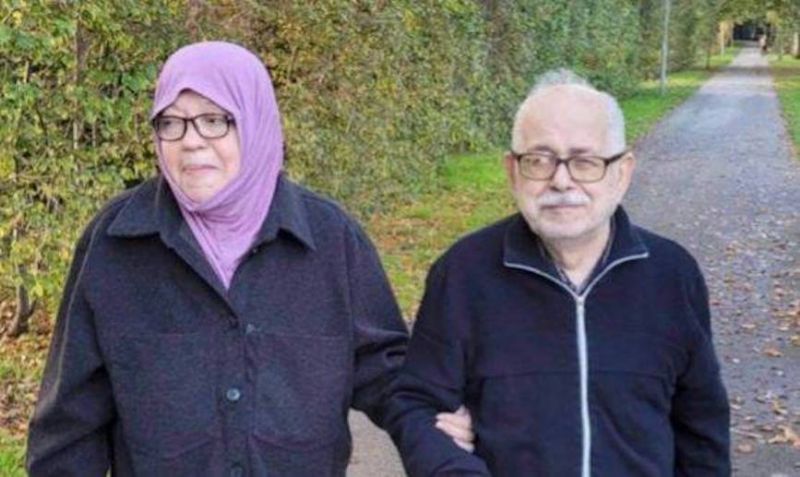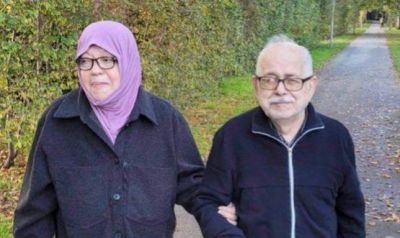
Khadija and Ahmad Bathich. (Credit: Twitter)
Khadija Bathich, 65, and Ahmad Bathich, 78, were sleeping peacefully in their room at the retirement home in Tonder, a small town in southern Denmark, when police knocked at their door.
The couple and five of their children were flown back to Lebanon on the same day, Nov.1. They claim to be Syrian, but Danish authorities and Lebanese sources say they are Lebanese.
The story of this family and their forcible deportation has grabbed headlines in Denmark and raised the ire of human rights organizations.
The country’s leading daily, Politiken, has been following up on the Bathich family’s efforts to obtain asylum before the Refugee Board rejected them.
The residence permit of the couple and five of their children was revoked over the summer. By court order, they were all transferred to a departure center for rejected asylum seekers, Kærshovedgård (in Jutland).
Two of the couple’s sons are legal residents of Denmark. L’Orient-Le Jour has not been able to contact them.
The treatment of the elderly couple, who suffer severe health problems, provoked a public outcry.
According to Politiken journalist Frank Hvilsom, who spoke to L’Orient-Le Jour, Khadija Nahouli suffers from severe post-traumatic stress syndrome, constant dizziness and headaches, grave whiplash, urinary incontinence, and diabetes.
Her husband suffers from dementia, kidney disease, cognitive impairment, is visually impaired and has difficulty walking.
According to a Politiken report Ismail Bathich, one of the couple’s sons, spent 16 nights in his car in October to lobby for his parents’ transfer to a nursing home where they could receive proper care.
“It is outrageous and inhumane to drag elderly and sick people out of their beds in the middle of the night,” Haifa Awad, a Syrian-Danish doctor and chairwoman of the NGO ActionAid Denmark, told L’Orient-Le Jour.
“It is very harsh but according to Danish law, you can be forcibly deported. Danish soldiers have the right to send them out of Denmark,” Jytte Lindgård, the family's lawyer, told L’Orient-Le Jour.
Damascene refugees
The timing of this expulsion also raises some questions.
“The authorities took the decision [to deport the family] on the day of the Danish [parliamentary] elections, which is perhaps not a coincidence. But everyone, including the media, was busy with the election,” Haifa' Awad said.
The outgoing Danish Prime Minister, Social Democrat leader Mette Frederiksen, came out on top Tuesday with 27.5 percent of the vote (compared to 25.5 percent in 2019).
Last year, Denmark tightened its immigration policy and reiterated its intention to deport Syrian refugees hailing from Damascus and its suburbs.
This controversial decision is nothing new. In 2019, Denmark designated Damascus as “safe” and has been reconsidering the cases of hundreds of refugees.
For Copenhagen, “the current situation in Damascus is no longer such as to justify a residence permit or extension of a residence permit”.
While the Danish government, which has not normalized ties with Damascus, cannot forcibly repatriate Syrian refugees without residence permits, those are faced with two choices.
They can either return to Syria voluntarily with compensation of about $28,000 or remain indefinitely in the “deportation camps,” as activists call them.
The Bathich family, who claim to be Syrian nationals from Damascus, refused to return to Syria, so they were forcibly deported to Lebanon because Danish authorities claim they have Lebanese nationality.
“The seven people who were sent back to Lebanon on Nov. 1 were all Lebanese citizens who were illegally staying in Denmark,” a spokesperson for the Danish Return Agency, which is affiliated with the Ministry of Immigration and Integration, told L’Orient-Le Jour.
According to local media reports, Danish authorities believe that Ahmad Bathich, the father, was issued a Lebanese passport while his family was living in a Syrian refugee camp in Lebanon, and he is therefore both Lebanese and Syrian.
It is true that some Syrian citizens have obtained Lebanese citizenship in recent years, but these were limited to businessmen with significant interests in Lebanon and powerful political connections.
By this criteria, it seems unlikely that a Syrian family living in a refugee camp was naturalized as Lebanese.
“They are Syrian citizens, and the Danish authorities know that. They consider them to have dual nationality, and that’s why they were returned to Lebanon,” Lindgård, the family lawyer, explained.
Born in Syria
This suspicious situation has fueled theories in Denmark of a secret agreement between Lebanon and Denmark. Suspicions were heightened because Danish authorities refused to provide Lindgård with documents proving that the family has indeed Lebanese nationality.
On the Lebanese side, the issue seems to be causing embarrassment. None of the Lebanese authorities interviewed for this story wished to be named.
A security source confirmed that all members of the Bathich family do indeed have Lebanese nationality.
Another Lebanese diplomatic source told L’Orient-Le Jour that the parents were “born in Syria but do have Lebanese nationality.”
“Lebanese authorities would never have accepted their return to the country if they were only Syrian,” the diplomatic source stressed.
The Lebanese government is now actively working on its plan to repatriate 15,000 refugees per month, which began last week with the departure of more than 750 people.
Did the Bathich family commit fraud by not mentioning their Lebanese nationality to Danish authorities, or were they victims of a bargain: their repatriation to Lebanon in exchange for financial compensation to the Lebanese government?
In Denmark, both hypotheses are now being raised. L’Orient-Le Jour has tried to contact members of the Bathich family, who are now in Lebanon, without success.
This story was originally published in French in L’Orient-Le Jour, translated by Sahar Ghoussoub.
